More Junkmail from Bob, #226
Ode to Freedom
"After several weeks of civil unrest, the East German government announced on 9 November 1989 that all GDR citizens could visit West Germany and West Berlin. Crowds of East Germans crossed and climbed onto the wall, joined by West Germans on the other side in a celebratory atmosphere."It was the beginning of the end of the Berlin Wall. About that time, my baby sister Tricia absconded with a piece of the wall. She still has it. She uses it for crowd control at home.
Leonard Bernstein directed Beethoven's 9th Symphony in Berlin in a "hastily arranged" concert on December 25, 1989. There were players and singers from East and West Germany, as well the New York Philharmonic, Kirov Orchestra, London Symphony and Orchestre de Paris (the 4 allied powers). That all doesn't seem too unusual now, but it sure was then. It was broadcast in 25 countries and about 100 million people heard it. They still broadcast that performance on New Year's Eve.
http://articles.latimes.com/1989-12-25/entertainment/ca...
The afternoon before the concert Bernstein said that it was his happiest Christmas ever. It would be his last. German re-unification was accomplished on October 3, 1990. Leonard Bernstein died of a heart attack eleven days later at the age of 72.
http://www.youtube.com/watch?v=IInG5nY_wrU
Beethoven was completely deaf when he wrote his ninth symphony.

Score of the 4th movement
Original score

The War on Education
Oklahoma's war on education is in full swing. Funding for public schools was cut more than 22% this year, more than $800 per student. Pryor Schools lost $700,000 in funding this year, on top of last year's cuts.The state legislature explained the cuts, saying "It actually was not our idea. We just stick to the party line and do what we're told by the Republican National Committee in Washington. Besides, our kids don't need to know all that stuff. We can outsource math and science to India and China. And nobody reads books any more. We learn everything we need to know from YouTube."
It makes a person proud.
http://newsok.com/report-oklahoma-leads-nation-in-perce...
A Million Pictures
The British Library released over a million images from books 100 to 400 years old. You can see them all on Flickr Commons.Hurry! Someone will be issuing DMCA takedown notices soon.
Not to be outdone, the Bodleian Libraries at the University of Oxford and the Vatican Apostolic Library have digitized some books from the 1500's back to the year 600 or so, and put them online for anybody to read. The Gutenberg Bible is included. Knowledge of Greek and Hebrew helps. Those people before printing presses used really consistent handwriting.
http://bav.bodleian.ox.ac.uk/browse
Epidemic
Attention Deficit Disorder has been diagnosed in one out of seven U.S. students. There are about 3.5 million children currently taking drugs for ADHD in the U.S.I believe that's too many. But the drug companies differ. They are spending lots of millions marketing their amphetamines to parents for use on their toddlers. ("Finally! Schoolwork that matches his intelligence.") Since 2000, every major ADHD maker has received citations from the FDA for false and misleading advertising. It has not slowed the marketing campaigns, though.
http://www.nytimes.com/2013/12/15/health/the-selling-of...
On the other hand, if you don't drug your children, they could turn out as bad as their parents. I'm pretty sure my kids needed barbiturates instead of amphetamines, but they didn't get either. In fact, they were lucky to get fed when their mother wasn't home.
Helium Sounds
The speed of sound in helium is almost 3 times faster than that in air. That's why you sound funny when you breathe helium. The resonance changes because the speed of sound changes. Your vocal chords don't change.http://hyperphysics.phy-astr.gsu.edu/hbase/sound/souspe...
Bitcoins
Bitcoins are a form of international digital currency. They've been in the news lately because they've been getting popular and the price of a bitcoin has gone up from $0.30 in 2011 to $5 in May 2012, to around $900 today. There are little over 12 million bitcoins in circulation.http://blockchain.info/charts/total-bitcoins?timespan=all
It's hard for me to understand why bitcoins are worth so much (or any) money. I guess the obvious answer is that they're worth money because you can sell them. When they first came out, I was sure it was a stupid idea and that nobody in their right mind would ever use them. A price of one cent per bitcoin was far too high, in my opinion. And every time the value increased, I felt the same. Now, since there is a fairly solid market to sell bitcoins, I have conceded that they may be worth more than one cent.
The supply of bitcoins is guaranteed to be limited, and bitcoins have a generally accepted value that can be used to exchange for real money. The value of bitcoins is prone to fluctuation, though. There are no governmental institutions to stabilize exchange rates for bitcoins. There are also no governmental institutions to insure bitcoin accounts at bitcoin "banks" or exchanges. Occasionally someone will rob a bitcoin bank, or a bitcoin bank will fail or disappear, and the depositors lose some or all their bitcoins.
One unique thing about bitcoins is that each one is represented by a number. This is unique because the number is unique. That would be easy to understand if there was a trustworthy central government or bank that was in charge of keeping track of bitcoin numbers and ownership, but there's not. It's done on a peer-to-peer basis.
Instead, there is a public ledger of bitcoin transactions showing every transfer of each bitcoin (or fraction of a bitcoin) since the bitcoin was created. This is called a blockchain, and is used to verify ownership of the bitcoins.
Bitcoin transactions are intentionally computationally hard to verify, in order to prevent fraud through duplicate transactions (transferring the same bitcoin to two different people) or fake bitcoins.
But you can get paid in bitcoins to make these computationally difficult verifications. This is called bitcoin mining.
Currently, using a normal CPU or GPU for bitcoin mining, it costs more in electricity than you earn in bitcoins. That is, unless you use a botnet. But there is specialized hardware available for bitcoin mining:
http://www.butterflylabs.com/
Using these specialized encryption processors, you can mine for a while and then sell the encryption processer. You can make a decent profit if the price of bitcoins doesn't crash.
You can create a bitcoin wallet using any of several applications.
http://bitcoin.org/en/choose-your-wallet
Each wallet is essentially a bitcoin address that uses public key encryption. Anybody can create their own bitcoin address or wallet. A wallet can contain any number of bitcoins, including small fractional amounts. Using your wallet's private key, you can send a bitcoin to any other bitcoin wallet in the world.
If someone copies my private key, they can empty my bitcoin wallet. If my computer dies and I don't have a backup of the wallet, I lose its contents. It's a little like keeping money at home. If you're robbed or the house is blown away by a tornado, you lose it.
Who uses bitcoins? It's kind of a fad at the moment. People who want to get away from government institutions and banks put some money into it. Others are speculating on bitcoins. A few use bitcoins for illegal purchases, for things such as drugs and hacking software.
Bitcoin transactions are effectively anonymous at the moment, but with the pedigree of each bitcoin maintained publicly forever, this won't always be the case. The pedigree contains the wallet address, which is normally anonymous, but it is possible to government institutions to track them down. If I was looking for a place to invest the proceeds of one of my frequent armed bank robberies, I would probably not choose a bitcoin wallet or exchange.
For investment? Bitcoins are unregulated and speculative, so that leaves me out. I would recommend that someone invest no more money in bitcoins than they're willing to lose.
That said, the bitcoin system seems pretty secure, and at the moment, there seem to be a lot of "bigger fools out there". While a lot of unsavory people have been trying to hack it for years, there has been only one exploit exploited, and that was early on and quickly fixed. A few bitcoin exchanges or banks have lost a lot of their depositors' bitcoins, either through external hacking or internal fraud. If you trust your own backups, there might be less risk in using your own bitcoin wallet rather than an exchange.
I'm not sure what will happen if it gets too expensive to mine bitcoins. It seems like it might be hard to get transactions verified after a bitcoin crash.
http://www.michaelnielsen.org/ddi/how-the-bitcoin-proto...
http://zen.lk/2013/11/28/how-i-finally-understood-bitcoin/
www.infoworld.com/t/cringely/greed-isnt-good-3-reasons-not-bite-bitcoin-232623
There are some shady characters using bitcoins for legally questionable and probably unquestionably illegal transactions. Bitcoin transfers are anonymous in theory, but there is the perpetual ledger that identifies the bitcoin addresses all previous owners of a bitcoin. If a government institution identified all these, the would have a complete record of a bitcoin's history.
http://www.techdirt.com/articles/20131002/10493324730/f...
http://www.techdirt.com/articles/20131002/17220924733/s...
Open Street Map
You can now use open, non-commercial street maps in your web site and applications. This is an alternative to Google Maps, MapQuest, and other mapping applications. I think it's pretty cool because anybody can use the data.http://www.openstreetmap.org
https://en.wikipedia.org/wiki/OpenStreetMap
Google Search thinks I have been in Birmingham, Alabama instead of Pryor, Oklahoma for the past couple of months. I can't figure out how to disable the location in my search results.
When I fired up openstreetmap.org just now, it asked if I wanted to share my location. I did. Now it thinks I'm in Alabama, too!
Government Scam
A bureaucrat at the EPA had a great deal going until he got caught. He claimed "national security" and said he was working for the CIA. The EPA, like the rest of the country in deference to Security Theater, turned a blind eye while he flew around the world, goofed off at home, and did very little work at his real job. He didn't get caught until he announced his retirement but kept collecting a paycheck. It's really pretty funny.http://investigations.nbcnews.com/_news/2013/12/16/2191...
Alien Intelligence
There are a lot of stars in the sky. About 9,000 are visible with the naked eye, 200,000 with a good pair of binoculars, and a couple hundred thousand stars can be seen with a small telescope. That's a lot of stars.But with high powered telescopes and a little math, we can estimate 400,000,000,000 stars in our galaxy, the Milky Way. With around 170 billion galaxies, give or take a dozen, there may be about 1,000,000,000,000,000,000,000,003 stars in the universe.
http://www.universetoday.com/102630/
Some of those have planets, and some of those planets have environments similar to earth. It seems likely that some of those planets might have life, and some of those with life would have intelligent life.
Sure, you say. Why would there be intelligent life elsewhere when there is none on earth? The fact is, not everybody is as dumb as me. Some people have a brain, and a few actually put them to use.
Let's say, for the purposes of discussion, that there are people (or something similar, such as politicians) on other planets. Why haven't we met any?
The answer is simple. It's too far, there is a speed limit, and it takes a long time and a lot of energy to get to another habitable planet.
If we could travel at the speed of light, the ultimate speed limit, it would still take over a million years to get to 99.9999999999% of the stars flying around the universe.
OK, how about traveling to one of the closer stars? There are 50 stars within about 16 light years of earth. Let's pick the closest, Alpha Centauri, about 4 light years away.
We'll build a nuclear pulse rocket. We'll just send the Alpha Centaurians an ipod with some music on it. That way we won't need to worry about food, water, air, radiation shielding, or a piano for human passengers.
Making a one-way trip in a reasonable time frame (130 years) will require a spaceship of about 100,000 tons, just to deliver our ipod to Alpha Centauri. At the moment, that's a little heavier than we can lift into earth orbit in one launch.
So let's give up on interstellar travel. We'd need better technology, and we're not going to get it cutting our education budget 22% per year. Let's just send an email to the 50 nearest stars. The problem is, even if they get the message, we won't "hear" the reply with our current technology. It would be far too weak.
If there is intelligent life on other planets, why don't we receive radio transmissions from them? They should be communicating somehow on the electromagnetic spectrum, and we would notice non-random modulations.
There's an organization called SETI that listens for extraterrestrial life. They have not found any. But there's a good reason. If they were sitting on Alpha Centauri listening to earth, they wouldn't hear anything.
The best SETI experiments to date could detect earth-strength signals at a maximum distance of one light year. They'll have to be a couple of hundred times more sensitive to detect signals from the nearest 50 star systems (or the other radio transmissions will have to be a couple hundred times more powerful.) Besides, we'd end up cutting the project funding long before the first responses arrive eight years after we send the email.
http://www.seti.org/
What about aliens detecting our radio transmissions? There has been radio on earth for about 100 years. Marconi's signals have only reached the nearest 10,000 stars.
If there is intelligent life on other planets, why haven't they come here? It's not likely a civilization would or could send probes to the nearest 1000 planets, for example, because it's too expensive and it takes too long. If alien civilizations did explore other star systems, the odds are strongly against any of them coming to ours because of the number of other stars, and the time and energy required for interstellar travel. Even with technology much more advanced than ours, the energy and time requirements would be huge.
The conclusion is that if there is intelligent life on other star systems, it would be very unlikely for us to know about them or them about us.
You might have noticed that I have not mentioned warp drive, jump drive, wormholes, or other modes of faster than light travel you can read about in science fiction novels. If they exist, that could change everything.
http://www.keckobservatory.org/recent/entry/one_in_five...
Supply and Demand
Christmas sale! Get credentials for someone's bank account, $70,000+ balance, only $300! Custom DDoS attacks only $400.There has been so much stolen financial data recently that the prices have dropped 30-40 percent.
http://www.darkreading.com/attacks-breaches/glut-in-sto...
http://www.bbc.co.uk/news/technology-25398408
The Theory of Revolution
https://medium.com/the-nib/c3c4da2ca495Wiki PR
Political parties have been creating (or paying to have created) Wikipedia pages on just about every national, state, and sometimes local politician. A lot of consulting companies, legal firms, and larger corporations are doing the same for their executives and janitors.The problem with this is that it's against the rules. Wikipedia doesn't allow me to make or edit a page on myself, or to pay someone else to make or edit a page about me, my organization, or my employees.
It's not feasible to strictly enforce this rule, of course, but Wikipedia is drawing the line at WikiPR. WikiPR is a company that offers Wikipedia page creation and editing. Or they did, until Wikipedia told them to stop. Eventually. After Wikipedia deleted 250 of their accounts.
http://arstechnica.com/tech-policy/2013/10/wikipedia-ed...
https://blog.wikimedia.org/2013/11/19/wikimedia-foundat...
Now they offer a page creation and editing service, and they "respect Wikipedia and its rules against promoting and advertising." Yeah, I couldn't see much difference there, either.
Surveillers
The U.S. government has doubled its request for user information from Google over the past three years.http://googleblog.blogspot.com/2013/11/government-reque...
These figures do not include the secret FISA requests.
They also do not include unauthorized information gathering, which might or might not occur, depending on the veracity of wild, unsubstantiated, and unpatriotic rumors running amok in places like Russia, Brazil, and California.
http://www.cnn.com/2013/12/17/politics/obama-nsa-tech-m...
Coffee Aromatics
Did you ever wonder why the coffee aisle at a store smells like fresh coffee?http://imgur.com/a/OyWTq
Behavior Detection
The GSA detected some bad behavior at the TSA.http://www.gao.gov/products/GAO-14-159
Afghanistan Recovery
Afghanistan has a record opium crop this year, not a first since the U.S. occupation.http://www.bbc.co.uk/news/world-asia-24919056
Venezuela
The new President of Venezuela is even nuttier than Chavez.http://www.usatoday.com/story/news/world/2013/11/11/ven...
http://www.reuters.com/article/2013/12/03/us-venezuela-...
Oklahoma Quakers
There have been 2,600 earthquakes in Oklahoma in the past three years, most too small to be felt. This is about 20 times more than there were 5 years ago. Surrounding states are also seeing increased earthquakes. The primary cause of the earthquakes is wastewater injection wells.http://www.nytimes.com/2013/12/13/science/earth...
Traffic Safety
Here's an interesting chart -- traffic deaths per 100,000 vehicles, by country. The U.S. has 15, Western Europe is generally 10 or under, Australia 8, New Zealand 11, etc., Togo, Ethiopia, and Liberia are over 10,000. 9 of the worst 10 countries are in Africa. Maybe I don't want to drive across Africa after all.Traffic Deaths
Traffic deaths per mile have dropped consistently in the U.S. This is probably true throughout the world, with safer cars and safer roads.
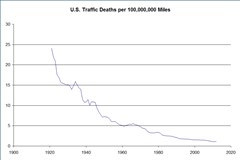
Petrol
The U.S. is now the largest producer of oil and natural gas in the world.http://blogs.marketwatch.com/energy-ticker/2013/10/04/m...
Rock Paper Scissors
How to win every time:http://www.bbc.co.uk/news/technology-24803751
Updates are Downgrades
Adblock Plus is a free extension that works with most browsers. You can use it to block ads. But, as with much modern software, the upgrades are downgrades. The new versions of Adblock Plus include many advertising companies on white lists -- which are never blocked -- all at no extra charge. Companies like Google pay Adblock to make their ads "immune".Adblock Plus is still good -- just delete all their white list rules.
http://www.neowin.net/news/report-google-paying-adblock...
Debugging
How to lose $172,222 a second for 45 minutes.http://pythonsweetness.tumblr.com/post/64740079543/how-...
SEC Proceeding
Get it right!
These two links are for my kids.http://www.businessinsider.com/11-common-grammatical-mi...
http://www.businessinsider.com/a-guide-to-proper-comma-...
Microsoft Competency
The other day I got an email from Microsoft concerning the Microsoft Partner Network. I must have signed up for it at some point in time, because I'm a member. Or maybe they bought a company like XyWrite or Hasbro and assimilated my product registration into the Microsoft Partner Network.I had little idea what a Microsoft Partner Network was or why I was part of it, so I wandered about their web site for a bit, trying to determine its function. As near as I could tell, there is no function. It was a little like the old Adventure computer games. You learn code words and pick up clues, and then you can move from one place to another.
I eventually came to a page that said I had no competencies. This is a commonly known aspect of my abilities and professional work ethic, yet this was different. I spotted a link where I could get some Microsoft Competencies. Woo Hoo! All I had to do was pass a quiz or two, and I'd be competent!
I immediately clicked the link and was rewarded with this 404 error.
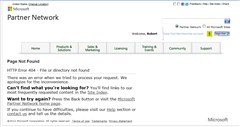
It was a cruel trick. Microsoft was the one with no competencies.
Handel
We're singing Handel's Messiah Friday at 6:30 at Jerry and Stephanie's house. As usual, the full Messiah, solos in unison. Be there! Practice here:http://xpda.com/messiah
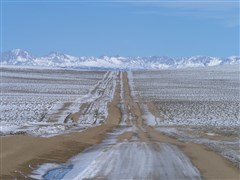


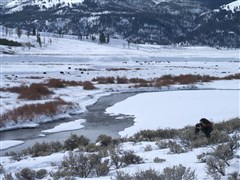

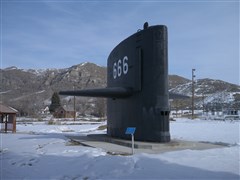
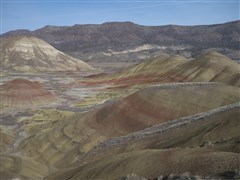



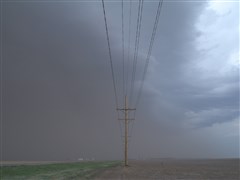

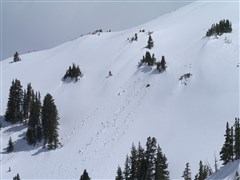



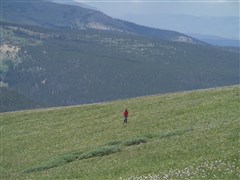

No comments:
Post a Comment